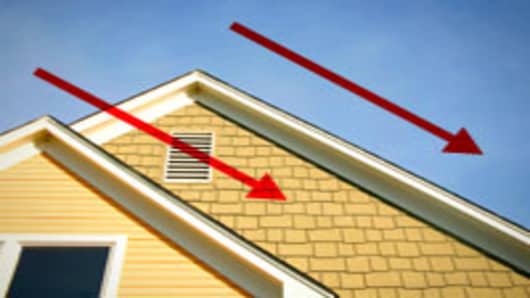Housing experts have taken an even more negative view of the industry, with a recent survey showing that expected price growth over the next four years has dropped by one-third.
The August MacroMarkets Home Price Expectations Survey found just 21 percent of experts believing that prices will rise in 2010.
That's a substantial drop-off from the first MacroMarkets survey three months ago and reflects expectations that prices will increase a maximum of 3.58 percent per year.
"For the third consecutive month, the consensus from the experts indicates weakened overall confidence in the US housing recovery, with only 21 percent of our panelists now predicting positive growth in prices nationwide for 2010, and average expected cumulative price appreciation through 2014 falling almost one-third since our inaugural survey just three months ago," Robert Shiller, MacroMarkets co-founder and chief economist, said in a statement.
Shiller helps put together the widely followed monthly Case/Shiller home price index, which presents a survey of the largest US cities and is considered a chief barometer of housing prices. The MacroMarkets survey is compiled from responses of 107 economists, real estate experts, and investment and market strategists.
Results come as the housing market has been hit by a battery of bad news this week showing that both existing and new housing purchases have fallen to precariously low levelssince the expiration of the $8,000 federal homebuyer tax credit.
The MacroMarkets survey examines price projections in part based on what it calls a "bubble-adjusted" price that takes into account the housing surge before its collapse over the past three years.
Even with that adjustment, the survey respondents felt the current market will be below pre-bubble levels—before 1999—at least through 2014.
"Nationally, home prices over-shot the pre-bubble trend more than a year ago, and as of the end of (the first quarter) this year, we're still languishing about 8 percent below that benchmark," said Terry Loebs, MacroMarkets managing director. "The average data from our August survey suggests that this negative gap will widen in the coming years."
The warning from MacroMarkets comes amid similar statements from other analysts that housing and unemployment will act as dual, severe drags on any potential economic recovery.
"[H]igh unemployment, weak income growth, falling confidence and tight credit conditions will mean that any rebound will be modest," Paul Dales, US economist for Capital Economics in Toronto, wrote in a note to clients. "Overall, the double-dip in both housing activity and house prices that now appears to be underway is one of many reasons why the US economy is probably heading for a number of years of economic growth of no more than 2 percent."
Bank of America Merrill Lynch warned clients of "a sluggish U-shaped housing recovery" with "home prices slipping back."
"Part of the recent deterioration reflects the volatility induced by the homebuyer tax credit, but even more so, a slower-than-expected jobs recovery," BofA analyst Michelle Meyer wrote. "The main factor determining the fate of the housing market will be the macro backdrop. If the economy falls back into recession, which we judge to be a 20% probability, the housing market will follow suit."




